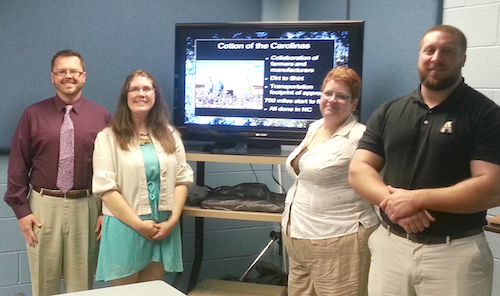 We absolutely love hearing from groups who want to use TS Designs and the Cotton of the Carolinas project within an educational setting.
We absolutely love hearing from groups who want to use TS Designs and the Cotton of the Carolinas project within an educational setting.
It happened again just recently. Jennifer H. from Caldwell Community College (Watauga Campus) in Boone, NC reached out to let us know that her team had chosen to research our company and present our process in their Logistics Class. As you can see, they highlighted some important facts from our Cotton of the Carolinas project.
Collaboration of Farmers and Manufacturers
When the Cotton of the Carolinas concept was introduced, industry professionals scoffed at the idea that farmers and manufacturers would actually make a concerted effort to work together to create a final product. Industry standard is that cotton is grown somewhere; and manufactures get their goods from that “somewhere.” It’s never as real as buying from the cotton farmer in the next county within the same state. And that is what Cotton of the Carolinas wanted to be – REAL.
Dirt to Shirt
We say made in America with pride. But it goes even beyond that. It starts by being grown in America – American soil and American farmers growing both conventional and organic cotton. And Cotton of the Carolinas gets even a little more detailed than that! We use NC dirt on NC farms to grow our cotton. We really like calling Carolina home – and we want to do all that we can to support our local area! So, we keep our cotton and make sure that our neighbors, who also happen to be textile experts, are the ones who benefit from what’s been grown. It’s really a great way to support local business!
Low Transportation Footprint
Because we keep all the activity right here in our country and within our state, we can keep our transportation footprint lower than the industry standard. All the stages that make up a supply chain could require thousands and thousands of miles of traveling. Just think about it – importing cotton from India or Egypt so that a tee can be made in the USA already puts a lot of miles on the final product. The Cotton of the Carolinas project keeps everything within about 700 miles. We’re doing everything we can to make sustainable choices.
—
We send our thanks to Jennifer H. and her Team for highlighting our work here at TS Designs!
